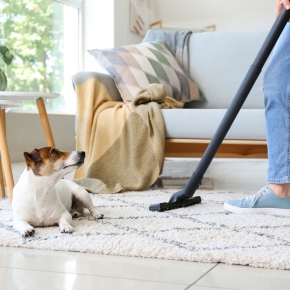
Before spring cleaning read our advice on seasonal dog allergies
March 21, 2024
Anyone who suffers from hay fever will know that spring and summer can be a miserable time. Did you know that dogs can get hay fever too? It’s true. But, did you also know that the symptoms of hay fever in dogs are very similar to the symptoms of dust allergies in dogs?
With many UK residents preparing for a big spring clean of their home, our veterinary team wants dog owners to know the symptoms of these two allergies to look out for.
Get our Spring Cleaning Tips for Pets with Allergies
Could my dog have hay fever
Hay fever, also known as allergic rhinitis, refers to allergic reactions to pollen from trees, grasses, weeds, or other plants. It can be more common in certain geographical areas and dependant on your dog’s local environment. Book a dog check-up if you are concerned.
Symptoms of hay fever in dogs may include:
- Itching around their face, ears, paws, and belly – they may scratch, rub their face against furniture or the ground, or lick excessively.
- Sneezing repeatedly in response to pollen exposure.
- Runny or congested nose, leading to nasal discharge.
- A dry or moist cough
- Watery or teary eyes which can appear red or inflamed.
- Skin irritations manifesting as redness, rash, hives, or hot spots.
Could my dog have a dust allergy
Dust allergies are relatively common in dogs too. Dust mites, along with other particles found in household dust, can trigger allergic reactions in dogs, leading to a condition known as atopic dermatitis or environmental allergies. Dogs may inhale or come into contact with dust particles, leading to skin irritation and other allergy symptoms.
Symptoms of dust allergies in dogs may include:
- Itching, particularly around the face, ears, paws, belly & groin – dogs may scratch, lick, or chew at their skin.
- Respiratory issues such as sneezing, coughing, wheezing, or difficulty breathing in response to inhaling dust particles.
- Skin irritations manifesting as redness, rash, hives, or inflamed skin in affected areas – the skin may appear irritated, scaly, or crusty.
- Hair loss from excessive scratching/licking, resulting in hair loss/bald patches on the skin.
- Ear infections characterised by itching, redness, discharge, or odour in the ears.
When treating allergy cases at either of our small animal clinics our vets often hear owners say “my dog can’t be allergic as they don’t have all the symptoms”.
Dogs, like humans, may react differently to allergens, and their immune responses can manifest in various ways i.e. not all dogs will have all the symptoms at once. In some cases, it is possible for dogs to experience respiratory issues as a result of dust allergies without exhibiting the other typical symptoms of skin irritation or itching.
Additionally, the severity of symptoms can vary among individual dogs, with some experiencing mild symptoms while others may have more severe respiratory issues. Get our guide to Spring Cleaning when you have pets with allergies.
Other dog allergies to consider
In some cases, dogs may be affected by both hay fever and dust allergies concurrently, especially if they have a predisposition to allergic sensitivities or are exposed to multiple allergens in their environment. It is also important to note that while pollen and dust allergies are common in dogs, they may also be affected by other types of allergies, such as flea allergies, food allergies, or mould allergies.
Treating your dog’s allergies
If you are witnessing any of the symptoms above and suspect your dog has a dust allergy or is experiencing allergic reactions to something, it’s best to act fast to help them feel better. Our Vet recommends getting them booked in with one of our vets for proper diagnosis and treatment.
As well as performing the necessary tests, our vets will recommend options to alleviate any respiratory discomfort and manage allergy symptoms effectively. Appropriate management strategies may include medication, dietary changes, or environmental modifications to reduce allergen exposure. Book a vet check today.


